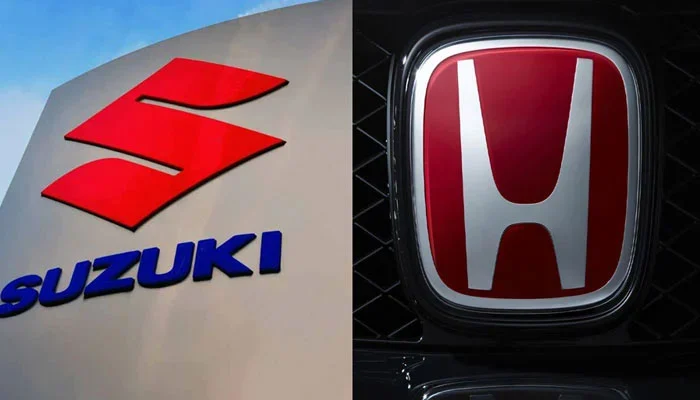- Pak Suzuki’s motorcycle plant to continue operations.
- Vehicle plant shutdown to occur on Oct 25-27.
- Honda Atlas to shut down from Oct 24-Oct 31.
KARACHI: Honda Atlas Cars and Pak Suzuki Motor Company (PSMC), the two major auto manufacturers in the country, have announced a temporary shutdown of production plants because of an ongoing shortage of essential raw materials, The News reported on Thursday.
“Due to the shortage of inventory levels, the management of the company has decided to shut down the automobile plant from October 25, 2023, to October 27, 2023. However, the motorcycle plant will continue its operations,” said the PSMC, in a statement issued by its company secretary.
A similar announcement was also made by Honda Atlas Cars through their company secretary.
“The current level of inventory and parts shortages within the company’s supply chain has severely disrupted operations. As a result, the company is unable to continue production and, consequently, will halt its plant from October 24, 2023, to October 31, 2023,” said the statement.
The shutdown by the automotive giants mirrors a broader issue that has been affecting Pakistan’s automobile sector for more than a year. Shortages in inventory levels have driven a cycle of temporary shutdowns across the industry.
Recently, the Indus Motor Company Limited (IMC) made headlines when it announced that it would be closing its production plant for an entire month, extending the impact of these supply chain challenges even further.
IMC’s month-long shutdown emphasises the extensive and far-reaching impact these issues have had on Pakistan’s industrial landscape.
According to The News, the problem is not confined to automobile sector.
A wide range of industries, including auto parts manufacturers, and companies reliant on imported raw materials, have been in a similar predicament. This forces the businesses to resort to periodic shutdowns, further straining the supply chain.
The ongoing shortage of essential raw materials is predominantly attributed to the scarcity of foreign exchange reserves in Pakistan. This challenge has resulted in a difficult process of opening letters of credit (LCs), hampering the ability to import crucial components.
As a consequence, the entire supply chain, from automobile manufacturers to their suppliers, faces severe disruptions, leaving them with no choice but to temporarily halt production.
Honda Atlas Cars and PSMC’s temporary shutdowns underscore the need to resolve supply chain issues for the stability and productivity of Pakistan’s automotive sector.
As per the publication, the stakeholders, along with the government, will need to work together to address the root causes and establish long-term solutions.
Analysts are of the view that swift action and cooperative strategies are essential to mitigate these disruptions and pave the way for a robust and resilient automotive industry.

 Latest News3 days ago
Latest News3 days ago
 Latest News3 days ago
Latest News3 days ago
 Latest News3 days ago
Latest News3 days ago
 Latest News3 days ago
Latest News3 days ago
 Latest News3 days ago
Latest News3 days ago
 Latest News3 days ago
Latest News3 days ago
 Latest News3 days ago
Latest News3 days ago
 Latest News3 days ago
Latest News3 days ago
























